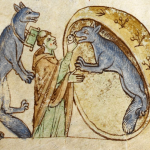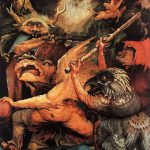THE AWAKENING OF THE WOLF
The days slipped slowly and wearily away, but Ravina showed no signs of relenting. Every evening, according to her bond, she spent two hours with Paul and made herself most agreeable, listening to his far-fetched compliments and asseverations of love and tenderness either with a cold smile or with one of her mocking laughs. She refused to allow Paul to visit her in her own apartments, and the only intruder she permitted there, save the servants, was little Katrina, who had taken a strange fancy to the fair woman. Alexis, on the contrary, avoided her as much as he possibly could, and the pair hardly ever met. Paul, to while away the time, wandered about the farm and the village, the inhabitants of which had recovered from their panic as the white wolf appeared to have entirely desisted from her murderous attacks upon belated peasants. The shades of evening had closed in as Paul was one day returning from his customary round, rejoiced with the idea that the hour for Ravina’s visit was drawing near, when he was startled by a gentle touch upon the shoulder, and turning round, saw the old man Michal standing just behind him. The intendant’s face was perfectly livid, his eyes gleamed with the luster of terror, and his fingers kept convulsively clasping and unclasping.
“My lord,” exclaimed he, in faltering accents; “oh, my lord, listen to me, for I have terrible news to narrate to you.”
“What is the matter?” asked Paul, more impressed than he would have liked to confess by the old man’s evident terror.
“The wolf, the white wolf! I have seen it again,” whispered Michal.
“You are dreaming,” retorted his master, angrily. “You have got the creature on the brain, and have mistaken a white calf or one of the dogs for it.”
“I am not mistaken,” answered the old man, firmly. “And oh, my lord, do not go into the house, for she is there.”
“She — who — what do you mean?” cried Paul.
“The white wolf, my lord. I saw her go in. You know the strange lady’s apartments are on the ground floor on the west side of the house. I saw the monster cantering across the lawn, and, as if it knew its way perfectly well, make for the center window of the reception room; it yielded to a touch of the fore paw, and the beast sprang through. Oh, my lord, do not go in; I tell you that it will never harm the strange woman. Ah! let me ——”
But Paul cast off the detaining arm with a force that made the old man reel and fall, and then, catching up an ax, dashed into the house, calling upon the servants to follow him to the strange lady’s rooms. He tried the handle, but the door was securely fastened, and then, in all the frenzy of terror, he attacked the panels with heavy blows of his ax. For a few seconds no sound was heard save the ring of metal and the shivering of panels, but then the clear tones of Ravina were heard asking the reason for this outrageous disturbance.
“The wolf, the white wolf,” shouted half a dozen voices.
“Stand back and I will open the door,” answered the fair woman. “You must be mad, for there is no wolf here.”
The door flew open and the crowd rushed tumultuously in; every nook and corner were searched, but no signs of the intruder could be discovered, and with many shamefaced glances Paul and his servants were about to return, when the voice of Ravina arrested their steps.”
“Paul Sergevitch,” sad she, coldly, “explain the meaning of this daring intrusion on my privacy.”
She looked very beautiful as she stood before them; her right arm extended and her bosom heaved violently, but this was doubtless caused by her anger at the unlooked-for invasion.
Paul briefly repeated what he had heard from the old serf, and Ravina’s scorn was intense.
“And so,” cried she, fiercely, “it is to the crotchets of this old dotard that I am indebted for this. Paul, if you ever hope to succeed in winning me, forbid that man ever to enter the house again.”
Paul would have sacrificed all his serfs for a whim of the haughty beauty, and Michal was deprived of the office of intendant and exiled to a cabin in the village, with orders never to show his face again near the house. The separation from the children almost broke the old man’s heart, but he ventured on no remonstrance and meekly obeyed the mandate which drove him away from all he loved and cherished.
Meanwhile, curious rumors began to be circulated regarding the strange proceedings of the lady who occupied the suite of apartments which had formerly belonged to the wife of the owner of Kostopchin. The servants declared that the food sent up, though hacked about and cut up, was never tasted, but that the raw meat in the larder was frequently missing. Strange sounds were often heard to issue from the rooms as the panic-stricken serfs hurried past the corridor upon which the doors opened, and dwellers in the house were frequently disturbed by the howlings of wolves, the footprints of which were distinctly visible the next morning, and, curiously enough, invariably in the gardens facing the west side of the house in which the lady dwelt. Little Alexis, who found no encouragement to sit with his father, was naturally thrown a great deal amongst the serfs, and heard the subject discussed with many exaggerations. Weird old tales of folklore were often narrated as the servants discussed their evening meal, and the boy’s hair would bristle as he listened to the wild and fanciful narratives of wolves, witches, and white ladies with which the superstitious serfs filled his ears. One of his most treasured possessions was an old brass-mounted cavalry pistol, a present from Michal; this he has learned to load, and by using both hands to the cumbrous weapon could contrive to fire it off, as many an ill-starred sparrow could attest. With his mind constantly dwelling upon the terrible tales he had so greedily listened to, this pistol became his daily companion, whether he was wandering about the long echoing corridors of the house or wandering through the neglected shrubberies of the garden. For a fortnight matters went on in this manner, Paul becoming more and more infatuated by the charms of his strange guest, and she every now and then letting drop occasional crumbs of hope which led the unhappy man further and further upon the dangerous course that he was pursuing. A mad, soul-absorbing passion for the fair woman and the deep draughts of brandy with which he consoled himself during her hours of absence were telling upon the brain of the master of Kostopchin, and except during the brief space of Ravina’s visit, he would relapse into moods of silent sullenness from which he would occasionally break out into furious bursts of passion for no assignable cause. A shadow seemed to be closing over the house of Kostopchin; it became the abode of grim whispers and undeveloped fears; the men and maid servants went about their work glancing nervously over their shoulders, as though they were apprehensive that some hideous thing was following at their heels.
After three days of exile, poor old Michal could endure the state of suspense regarding the safety of Alexis and Katrina no longer; and, casting aside his superstitious fears, he took to wandering by night about the exterior of the great white house, and peering curiously into such windows as had been left unshuttered. At first he was in continual dread of meeting the terrible white wolf; but his love for the children and his confidence in the crucifix he wore prevailed, and he continued his nocturnal wanderings about Kostopchin and its environs. He kept near the western front of the house, urged on to do so from some vague feeling which he could in no wise account for. One evening as he was making his accustomed tour of inspection, the wail of a child struck upon his ear. He bent down his head and eagerly listened, again he heard the same faint sounds, and in them he fancied he recognized the accents of his dear little Katrina. Hurrying up to one of the ground-floor windows, from which a dim light streamed, he pressed his face against the pane, and looked steadily in. A horrible sight presented itself to his gaze. By the faint light of a shaded lamp, he saw Katrina stretched upon the ground; but her wailing had now ceased, for a shawl had been tied across her little mouth. Over her was bending a hideous shape, which seemed to be clothed in some white and shaggy covering. Katrina lay perfectly motionless, and the hands of the figure were engaged in hastily removing the garments from the child’s breast. The task was soon effected; then there was a bright gleam of steel, and the head of the thing bent closely down to the child’s bosom.
With a yell of apprehension, the old man dashed in the window frame, and, drawing the cross from his breast, sprang boldly into the room. The creature sprang to its feet, and the white fur cloak falling from its had and shoulders disclosed the pallid features of Ravina, a short, broad knife in her hand, and her lips discolored with blood.
“Vile sorceress!” cried Michal, dashing forward and raising Katrina in his arms. “What hellish work are you about?”
Ravina’s eyes gleamed fiercely upon the old man, who had interfered between her and her prey. She raised her dagger, and was about to spring in upon him, when she caught sight of the cross in his extended hand. With a low cry, she dropped the knife, and, staggering back a few paces, wailed out: “I could not help it; I liked the child well enough, but I was so hungry.”
Michal paid but little heed to her words, for he was busily engaged in examining the fainting child, whose head was resting helplessly on his shoulder. There was a wound over the left breast, from which the blood was flowing; but the injury appeared slight, and not likely to prove fatal. As soon as he had satisfied himself on this point, he turned to the woman, who was crouching before the cross as a wild beast shrinks before the whip of the tamer.
“I am going to remove the child,” said he, slowly. “Dare you to mention a word of what I have done or whither she has gone, and I will arouse the village. Do you know what will happen then? Why, every peasant in the place will hurry here with a lighted brand in his hand to consume this accursed house and the unnatural dwellers in it. Keep silence, and I leave you to your unhallowed work. I will no longer seek to preserve Paul Sergevitch, who has given himself over to the powers of darkness by taking a demon to his bosom.”
Ravina listened to him as if she scarcely comprehended him; but, as the old man retreated to the window with his helpless burden, she followed him step by step; and as he turned to cast one last glance at the shattered window, he saw the woman’s pale face and bloodstained lips glued against an unbroken pane, with a wild look of unsatiated appetite in her eyes.
Next morning the house of Kostopchin was filled with terror and surprise, for Katrina, the idol of her father’s heart, had disappeared, and no signs of her could be discovered. Every effort was made, the woods and fields in the neighborhood were thoroughly searched; but it was at last concluded that robbers had carried off the child for the sake of the ransom that they might be able to extract from the father. This seemed the more likely as one of the windows in the fair stranger’s room bore marks of violence, and she declared that, being alarmed by the sound of crashing glass, she had risen and confronted a man who was endeavoring to enter her apartment, but who, on perceiving her, turned and fled away with the utmost precipitation.
Paul Sergevitch did not display as much anxiety as might have been expected from him, considering the devotion which he had ever evinced for the lost Katrina, for his whole soul was wrapped up in one mad, absorbing passion for the fair woman who had so strangely crossed his life. He certainly directed the search, and gave all the necessary orders; but he did so in a listless and half-hearted manner, and hastened back to Kostopchin as speedily as he could as though fearing to be absent for any length of time from the casket in which his new treasure was enshrined. Not so Alexis; he was almost frantic at the loss of his sister, and accompanied the searchers daily until his little legs grew weary, and he had to be carried on the shoulders of a sturdy moujik. His treasured brass-mounted pistol was now more than ever his constant companion; and when he met the fair woman who had cast a spell upon his father, his face would flush, and he would grind his teeth in impotent rage.
The day upon which all search had ceased, Ravina glided into the room where she knew that she would find Paul awaiting her. She was fully an hour before her usual time, and the lord of Kostopchin started to his feet in surprise.
“You are surprised to see me,” said she; ‘but I have only come to pay you a visit for a few minutes. I am convinced that you love me, and could I but relieve a few of the objections that my heart continues to raise, I might be yours.”
“Tell me what these scruples are,” cried Paul, springing towards her, and seizing her hands in his; “and be sure that I will find means to overcome them.”
Even in the midst of all the glow and fervor of anticipated triumph, he could not avoid noticing how icily cold were the fingers that rested in his palm, and how utterly passionless was the pressure with which she slightly returned his enraptured clasp.
“Listen,” said she, as she withdrew her hand; “I will take two more hours for consideration. By that time the whole of the house of Kostopchin will be cradled in slumber; then meet me at the old sundial near the yew tree at the bottom of the garden, and I will give you my reply. Nay, not a word,” she added, as he seemed about to remonstrate, “for I tell you that I think it will be a favorable one.”
“But why not come back here?” urged he; “there is a hard frost to-night, and ——”
“Are you so cold a lover,” broke in Ravina, with her accustomed laugh, “to dread the changes of the weather? But not another word; I have spoken.”
She glided from the room, but uttered a low cry of rage. She had almost fallen over Alexis in the corridor.
“Why is that brat not in his bed? ” cried she, angrily; “he gave me quite a turn.”
“Go to your room, boy,” exclaimed his father, harshly; and with a malignant glance at his enemy, the child slunk away.
Paul Sergevitch paced up and down the room for the two hours that he had to pass before the hour of meeting. His heart was very heavy, and a vague feeling of disquietude began to creep over him. Twenty times he made up his mind not to keep his appointment, and as often the fascination of the fair woman compelled him to rescind his resolution. He remember that he had from childhood disliked that spot by the yew tree, and had always looked upon it as a dreary, uncanny place; and he even now disliked the idea of finding himself here after dark, even with such fair companionship as he had been promised. Counting the minutes, he paced backwards and forwards, as though moved by some concealed machinery. Now and again he glanced at the clock, and at last its deep metallic sound, as it struck the quarter, warned him that he had but little time to lose, if he intended to keep his appointment. Throwing on a heavily furred coat and pulling a traveling cap down over his ears, he opened a side door and sallied out into the grounds. The moon was at its full, and shone coldly down upon the leafless trees, which looked white and ghostlike in its beams. The paths and unkept lawns were now covered with hoar frost, and a keen wind every now and then swept by, which, in spite of his wraps, chilled Paul’s blood in his veins. The dark shape of the yew tree soon rose up before him, and in another moment he stood beside its dusky boughs. The old gray sundial stood only a few paces off, and by its side was standing a slender figure, wrapped in a white, fleecy-looking cloak. It was perfectly motionless, and again a terror of undefined dread passed through every nerve and muscle of Paul Sergevitch’s body.
“Ravina!” said he, in faltering accents. “Ravina!”
“Did you take me for a ghost?” answered the fair woman, with her shrill laugh; “no, no, I have not come to that yet. Well, Paul Sergevitch, I have come to give you my answer; are you anxious about it?”
“How can you ask me such a question?” returned he; “do you not know that my whole soul has been aglow with anticipations of what your reply might be? Do not keep me any longer in suspense. Is it yes, or no?”
“Paul Sergevitch,” answered the young woman, coming up to him and laying her hands upon his shoulders, and fixing her eyes upon his with that strange weird expression before which he always quailed; “do you really love me, Paul Sergevitch?” asked she.
“Love you!” repeated the lord of Kostopchin; “have I not told you a thousand times how much my whole soul flows out towards you, how I only live and breathe in your presence, and how death at your feet would be more welcome than life without you?”
“People often talk of death, and yet little know how near it is to them,” answered the fair lady, a grim smile appearing upon her face; “but say, do you give me your whole heart?”
“All I have is yours, Ravina,” returned Paul, “name, wealth, and the devoted love of a lifetime.”
“But your heart,” persisted she; “it is your heart that I want; tell me, Paul, that it is mine and mine only.”
“Yes, my heart is yours, dearest Ravina,” answered Paul, endeavoring to embrace the fair form in his impassioned grasp; but she glided from him, and then with a quick bound sprang upon him and glared in his face with a look that was absolutely appalling. Her eyes gleamed with a lurid fire, her lips were drawn back, showing her sharp, white teeth, whilst her breath came in sharp, quick gasps.
“I am hungry,” she murmured, “oh, so hungry; but now, Paul Sergevitch, your heart is mine.”
Her movement was so sudden and unexpected that he stumbled and fell heavily to the ground, the fair woman clinging to him and falling upon his breast. It was then that the full horror of his position came upon Paul Sergevitch, and he saw his fate clearly before him; but a terrible numbness prevented him from using his hands to free himself from the hideous embrace which was paralyzing all his muscles. The face that was glaring into his seemed to be undergoing some fearful change, and the features to be losing their semblance of humanity. With a sudden, quick movement, she tore open his garments, and in another moment she had perforated his left breast with a ghastly wound, and, plunging in her delicate hands, tore out his heart and bit at it ravenously. Intent upon her hideous banquet she heeded not the convulsive struggles which agitated the dying form of the lord of Kostopchin. She was too much occupied to notice a diminutive form approaching, sheltering itself behind every tree and bush until it had arrived within ten paces of the scene of the terrible tragedy. Then the moonbeams glistened upon the long shining barrel of a pistol, which a boy was leveling with both hands at the murderess. Then quick and sharp rang out the report, and with a wild shriek, in which there was something beastlike, Ravina leaped from the body of the dead man and staggered away to a thick clump of bushes some ten paces distant. The boy Alexis had heard the appointment that had been made, and dogged his father’s footsteps to the trysting place. After firing the fatal shot his courage deserted him, and he fled backwards to the house, uttering loud shrieks for help. The startled servants were soon in the presence of their slaughtered master, but aid was of no avail, for the lord of Kostopchin had passed away. With fear and trembling the superstitious peasants searched the clump of bushes, and started back in horror as they perceived a huge white wolf, lying stark and dead, with a half-devoured human heart clasped between its fore paws.
No signs of the fair lady who had occupied the apartments in the western side of the house were ever again seen. She had passed away from Kostopchin like an ugly dream, and as the moujiks of the village sat around their stoves at night they whispered strange stories regarding the fair woman of the forest and the white wolf of Kostopchin. By order of the Tsar a surtee was placed in charge of the estate of Kostopchin, and Alexis was ordered to be sent to a military school until he should be old enough to join the army. The meeting between the boy and his sister, whom the faithful Michal, when all danger was at an end, had produced from his hiding place, was most affecting; but it was not until Katrina had been for some time resident at the house of a distant relative at Vitepak, that she ceased to wake at night and cry out in terror as she again dreamed that she was in the clutches of the white wolf.








